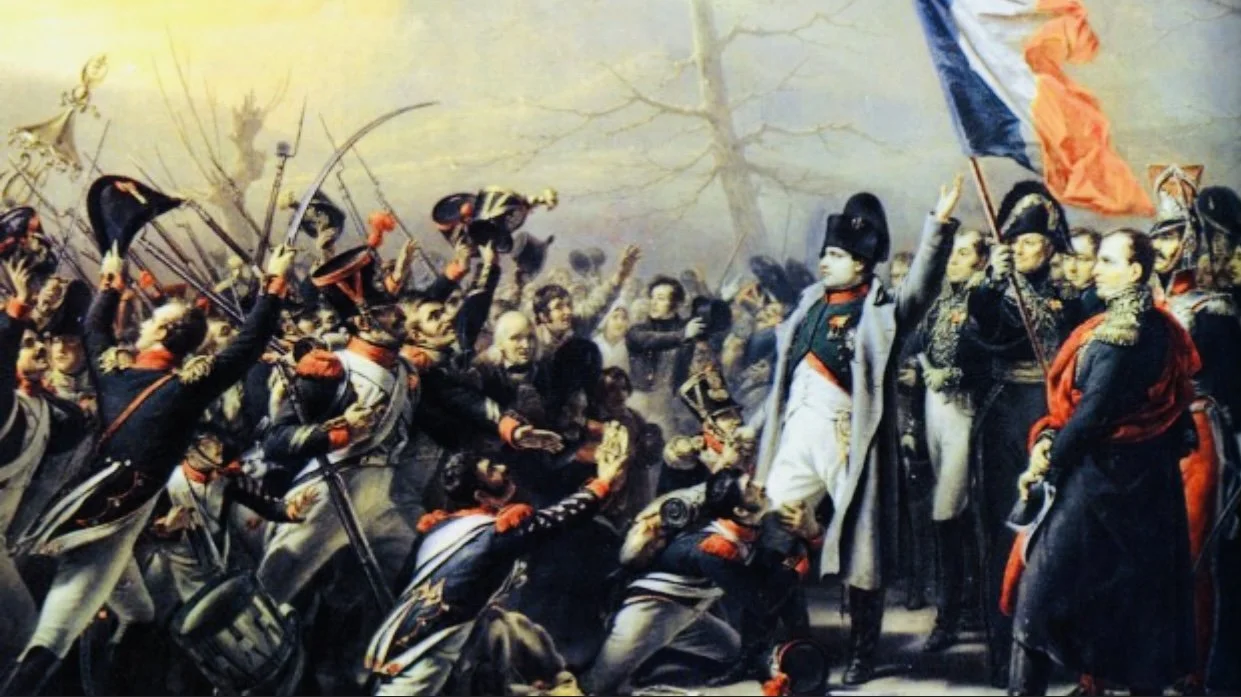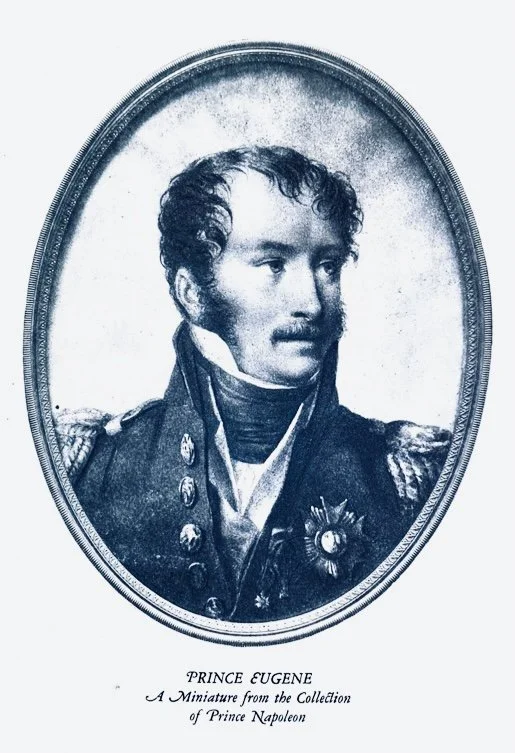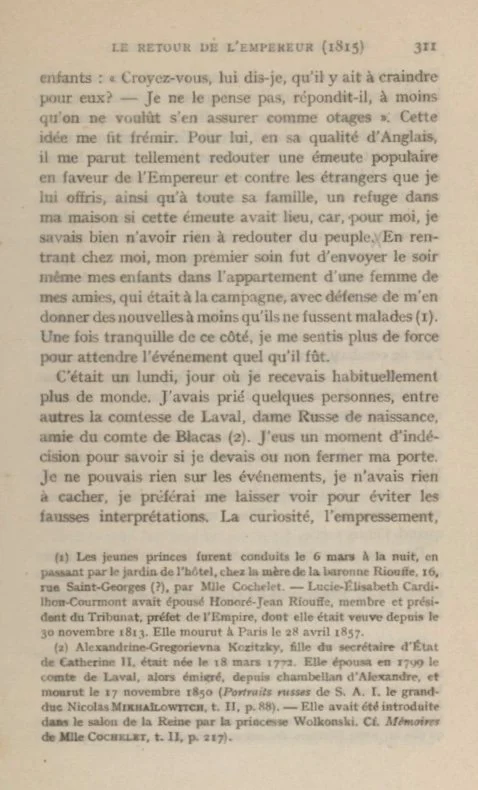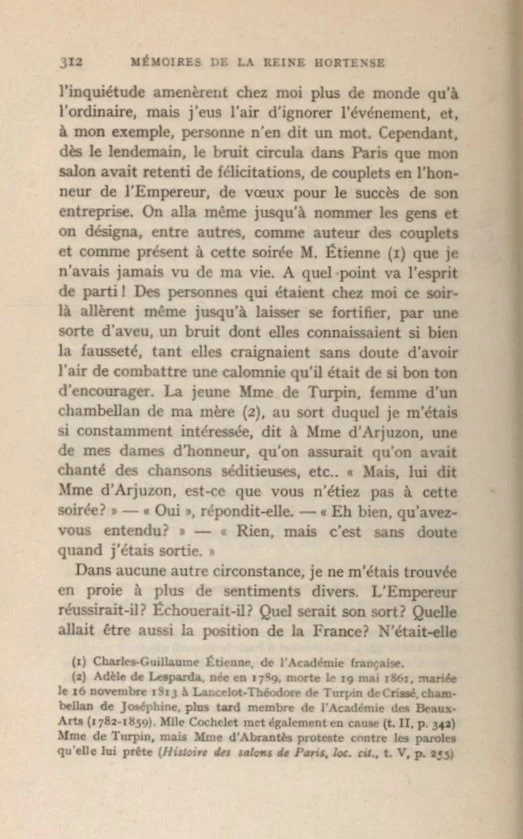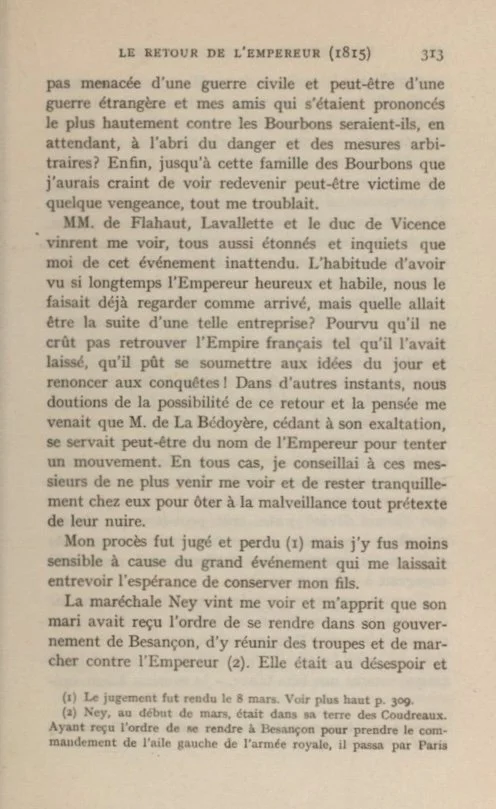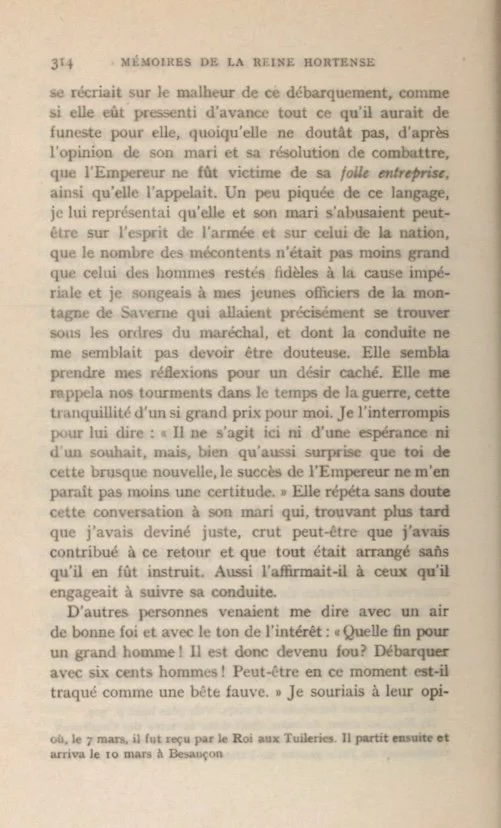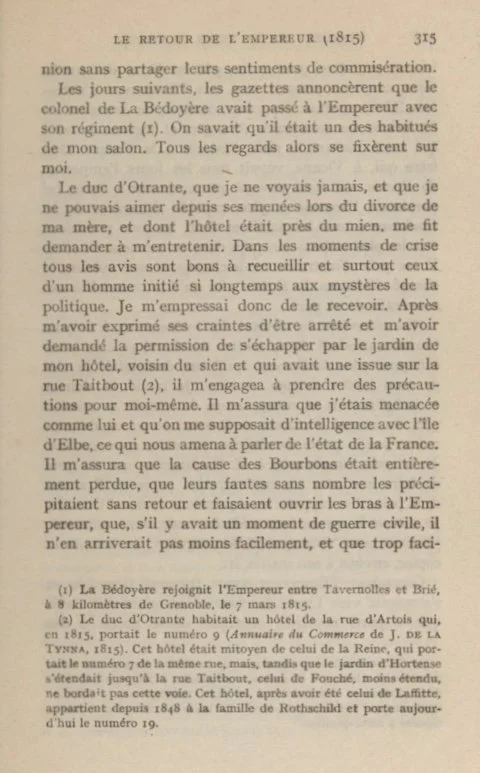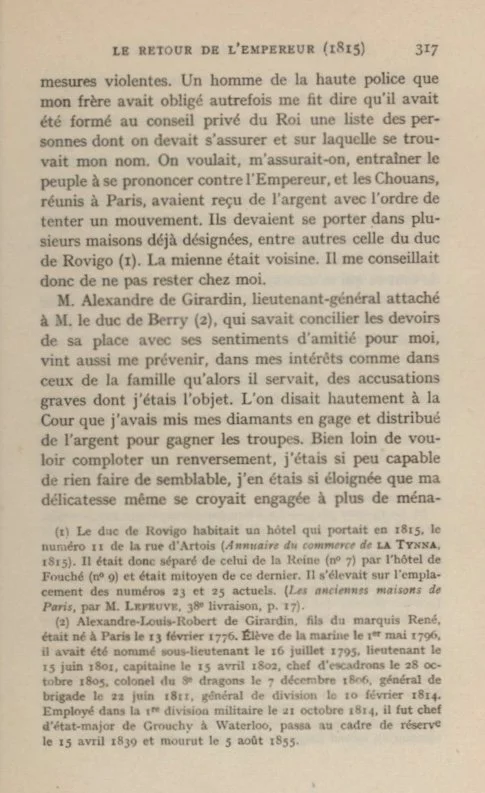Let’s have another look at Hortense’s Memoirs. If you want to read the book it is available for free at the side bar in English and French. Use the widget on the sidebar to translate the text below into pretty much any language.
Hortense describes her state when Napoleon began his return from Elba. We see here that paying for popular disturbances is nothing new. I got 2 months of disturbance in my neighborhood, Spring 2020. What else was launched via a publicist army on everyone’s screens at that time?
Hortense’s memoirs continues:
CHAPTER XIV
THE RETURN OF THE EMPEROR (MARCH 5-MARCH 21, 1815)
The Fifth of March, 1815–The Wife of Marshal Ney - The Emperor's Advance - The Queen Seeks Refuge with Madame Lefebre - While Paris Waits - The Emperor Enters His Capital - Hortense Is Received by Napoleon - A Great Review - At the Tuileries.
ON Monday, March 5, as I was coming back from my drive absorbed in melancholy thoughts, Lord Kinnaird appeared on horseback beside my carriage and said,
“Have you heard the great news, madame? Emperor Napoleon has landed at Cannes." I was amazed. He added that he had just left the house of the Duc d’Orleans, who was leaving for Lyons whither the Comte d'Artois had preceded him, and that the court was very much excited.
My first thought was for my children. I asked, "are they are in any danger?"
“No, I do not think so," he answered, "although perhaps they may be held as hostages." The idea of such a thing filled me with alarm.
He, being English, feared a popular uprising against foreigners and in favor of the Emperor, and was so alarmed that I offered him and all his family my house as refuge in case such a rising took place, for I knew that I had nothing to fear from the masses. On returning home I immediately sent my children to the apartment of one of my woman friends who was in the country, with orders not to send me word about them unless they were ill. Once this cause for anxiety was removed, I felt stronger to face whatever events might take place.
It was a Monday, the day on which, as a rule, I had the most visitors. I had invited several people, among them Comtesse de Laval, who was a Russian lady by birth and friend of the Comte de Blacas. For a moment I hesitated whether I had better leave word I was not at home. I could hide nothing in regard to what was taking place. I had nothing to hide, so I preferred to show myself in order to avoid any false interpretations of my conduct.
Curiosity, desire for news, general nervousness caused more people to come to see me than usual. I behaved as though I knew nothing about what had happened, and taking the cue from me no one else said a word about it either.
Nevertheless, the following morning all Paris heard how my drawing-room had echoed with congratulations, how verses had been sung in honor of the Emperor and how everyone had expressed hopes for his success.
People even went so far as to give the name of the author of the verses—a Monsieur Etienne, whom I had never seen and who was said to have been present at my house. To such lengths will political partisanship go.
The persons who really were present did nothing to refute these tales they knew they were false, but feared to destroy a piece of mischievous gossip which it seemed politic to encourage.
Young Madame de Turpin, the wife of my mother's chamberlain, whose benefactress I had always been, said to one of my maids of honor, Madame d'Arjuzon, that people assured her seditious songs had been sung.
“But," said Madame d'Arjuzon, "you were at that reception, weren't you?"
“Yes," replied Madame Turpin.
“Well, did you hear anything?"
“No, but probably it happened after I had left." Never had my emotions been so varied. Would the Emperor succeed? Would he fail? What fate awaited him? And also, what was going to happen to France?
Was it not threatened with a civil war in addition, perhaps, to a foreign conflict?
My friends who had so loudly protested against the Bourbons, were they in no danger of retaliatory measures? Then too there was the Bourbon family, who I feared might fall victims of political revenge. Everything worried me.
Monsieur de Flahaut, Monsieur Lavallette and the Duc de Vicence came to see me. They were equally astonished and uneasy about this unexpected event.
Our habit of seeing the Emperor successful on account of his skill and bravery caused us to believe already that he had regained his throne. But what would happen next? If only he did not expect to find the French Empire just as he had left it, if only he would accept more liberal methods of government and renounce dreams of new conquests.
Then too there were times when we doubted the possibility of his return. The thought occurred to me that perhaps Monsieur de La Bedoyère, obeying his mad impulses, had used the Emperor's name to provoke a rising.
In any event I advised these gentlemen not to come and see me again, but to stay at home quietly so that hostile opinion might have no pretext to take steps against them.
My lawsuit was decided, and I lost my case, but I was less distressed by this on account of the great events, which led me to hope I might still keep my son with me in spite of the court's verdict.
The wife of Marshal Ney came to see me and informed me that her husband had received orders to report to his headquarters at Besançon, there to assemble his troops and march against the Emperor.
She was filled with grief and lamented the Emperor's landing. It seemed as though she almost foresaw all the unhappiness that lay before her; although in view of her husband's opinion she could not at the time have supposed that the Emperor would not be the victim of this "mad adventure," as she called it.
Somewhat annoyed by this expression I pointed out to her that perhaps her husband and she were mistaken about the state of opinion in the army and throughout the country, that the malcontents might not be less numerous than those who supported the imperial cause.
As I spoke, I thought of the young officers at Saverne, who, as it happened, would find themselves under the Marshal's orders, and regarding whose conduct I was not for a moment in doubt. She seemed to consider my remarks an indication of my secret hopes.
She reminded me how worried we had been when war was going on and how much I valued our subsequent peace of mind. I interrupted her, saying: "There can be no question in this case of a hope or a wish, but although I am as surprised as you are by the sudden tidings, nevertheless the success of the Emperor seems to me to be a certainty."
She doubtless repeated this conversation to her husband, who, finding out later that I had been right, thought perhaps that I had had something to do with the Emperor's return and that everything had been arranged without his knowing about it.
This is what he assured all those whom he advised to act as he did. Other persons came to me and said with apparent sincerity and in a sympathetic manner, “What a sad end for such a great man. So he has gone crazy. The idea of landing with six hundred men. Perhaps at the very moment he is being tracked down like a wild beast." I smiled at their opinions without feeling called upon to share their pity. Days passed.
The newspapers announced that Colonel de La Bedoyère had gone over to the Emperor at the head of his entire regiment. People knew that he was one of my regular guests. Everybody's eyes were turned on me.
The Duc d'Otrante, whose house was close to mine but whom I never saw and could not like on account of his behavior at the time of my mother's divorce, asked me to receive him. In time of danger it is well to heed everyone's advice and especially that of a man familiar with all the intricacies of politics.
I consequently agreed to receive him immediately. After explaining that he feared to be arrested and asking permission in case of need to be allowed to escape by way of my garden, which was next his house and had an exit on the rue Taitbout, the Duke advised me to take precautions for my own safety.
He assured me that I was as much in peril as he was and that I was supposed to be in touch with Elba. This led us to talk about the general state of France. He declared that he considered the Bourbon cause hopeless, as their innumerable mistakes would lead to their permanent overthrow and make people receive the Emperor with open arms.
Even if there was a short civil war he would nevertheless win easily, too easily perhaps to allow conditions to be imposed on him, for he could not hope to be Emperor again as he had been in the past.
The Duke said it was extremely important to know what the intentions of the Allied Monarchs were and especially those of the sovereign who had shown the most sympathy toward France.
My brother at Vienna was seeing the Emperor of Russia daily. If Eugene came to Paris immediately, the Duke considered him the person who was the most likely to inspire the confidence of all political parties and whose advice would be the most useful to his country at this particular moment.
The Duke asked me to convey this opinion at once to the Russian charge d'affaires so that he could communicate it to his master. While waiting what turn events would take, he thought it best to go to some safe refuge. It was to facilitate such an escape that he asked for the key of my garden, which was next to his. I had it given him and I at the same time took the liberty of doing what he asked in regard to the Russian chargé d'affaires.
I did not even stop to think over this conversation. I simply repeated it to Monsieur Boutiaguine, who asked me to make a note of our talk because he might not remember exactly the expressions used by the Duc d'Otrante. I was merely a go-between in the matter, but without stopping to think I wrote the note Monsieur Boutiaguine asked for.
Instead of copying it he sent the original to his master. Meanwhile the Emperor had passed through Grenoble and was approaching Lyons. From every side rumor reached me that the royalist party was about to take violent measures.
A prominent police official for whom my brother had formerly done a favor sent word to me that at a meeting of the King's private council a list of persons to be arrested had been drawn up. My name figured on that list. Plans were being made, so I was told, to provoke a popular insurrection against the Emperor, and the Chouans had concentrated in Paris and received money to stir up trouble.
The original French is available below:


